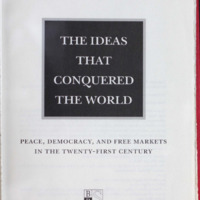-
Title
-
The ideas that conquered the world : peace, democracy, and free markets in the twenty-first century
-
Description
-
Continuing in the same tradition as Francis Fukuyama's The End of History, political science professor (and senior fellow of the Council on Foreign Relations) Mandelbaum continues the argument that capitalism and democracy are inextricably linked and that so-called "free markets" have emerged as indisputably triumphant in the world of contesting political and economic ideas. In exploring the political affairs of the United States, Europe, the Middle East, Russia, and China, he advances two propositions about liberal democracies that may seem surprising to observers of the current international scene: that democracies tend to conduct peaceful foreign affairs and that free markets naturally lead to democracy. One of America's leading foreign policy thinkers offers a major new statement about global politics in the 21st century, and shows how prevailing trends are remarkably favorable to the United States and the nations of the West.
-
Identifier
-
1054290
-
1586481347
-
Creator
-
Mandelbaum, Michael
-
Format
-
1st ed.
-
Source
-
Brian Lamb Booknotes Collection
-
Gift of Brian Lamb, 2011.
-
Catalog record
-
Language
-
eng
-
Date
-
2002
-
Program air date: October 20, 2002
-
Publisher
-
Public Affairs
-
George Mason University. Libraries. Special Collections & Archives
-
Text
-
Transcription of Annotations
Front and back endpapers contain notes on the significance of Woodrow Wilson as a prophet rather than a statesman and his idea that the concepts of peace, democracy and free markets - the Wilson Triad - would keep the peace after WWI. Notes regarding the author's conviction that the devaluation of war plays an important role in the rise of the market in the 21st century, the significance of foreign policy in America, the division of countries in consumers (periphery) and producers (core) and the tensions between them, are also included. Summaries of several of the chapters in the books are provided. Examples: Ch. 3. The idea of a sovereign state dates from 1648. America is identified as an imperial power; Britain and France are characterized as having invented the modern world. Ch.4. Creating a common security is compared to finding a cure for cancer. After the Cold War the military was only strong enough to defend satellites which lead to unification. To achieve a common security, the European states agreed not to fight each other. The expansion of NATO to Poland, Hungary, and the Czech Republic alienated Russia and is characterized as a fateful error. Reagan and Gorbachev, who the author sees as one of the great figures of the 20th century, built a common security for Europe. Ch.7. This chapter deals with terrorism, the Arab, Persian, Turkish great non-Western civilizations in the Middle East, and the nuclear non-proliferation treaty (NPT). Ch.8. Democratic countries seldom, if ever, go to war with one another. However, trade does not guarantee peace. Communication technologies can't readily be censored. Ch. 9. The collapse of communism was not the result of military victory. This is illustrated by comparing East and West Germany, North and South Korea, China and Taiwan, where the market principle was superior. Countries in South America were forced to liberalize because they couldn't pay their loans. Competition, productivity and self-interest are identified as powerful motives. Ch.10. The transition from communism to a market economy in Russia and China was difficult because of corruption and the lack of political and economic institutions. Ch. 11. This chapter defines three things that are desirable in a monetary system: that each government has an independent monetary policy, that exchange rates are fixed, and that the free flow of capital across borders exists. Ch. 12. If currency instability occurs, what impact do IMF, World Bank, WTO and NAFTA have? Wilson was convinced that trading partners would conduct peaceful foreign policy toward one another. Americans initiated managed trade. -- These questions and statements also form a part of the notes: "Impact of French Revolution and why?" - Why did communism fail?" - Did you ever think the Communist form of government would work in any way?" - "What is globalization?" - "What does it mean to let your currency float?" - "Liberal sovereign states [are the] second best solution after world government to problems of nuclear war, economic collapse and global climate change." - "The world after the Cold War, Russia's economic collapse - what's the impact on Africa?" - "Human happiness - a product of modernity?" -- Annotations by Brian Lamb in the margins and underlining of pertinent phrases throughout the book.
-
Subject
-
"World politics--1989-"
-
"Cold War."
-
"Post-communism."
-
"Globalization."
-
"Democracy."
-
"Ethnic conflict."
-
"Conflict management."
-
"Medical innovations."
-
Relation
-
Original Booknotes interview
-
Rights
-
This work may be protected by copyright laws and is provided for educational and research purposes only. Any infringing use may be subject to disciplinary action and/or civil or criminal liability as provided by law. If you believe that you are the rights-holder and object to Mason’s use of this image, please contact speccoll@gmu.edu.
 1054290.pdf
1054290.pdf